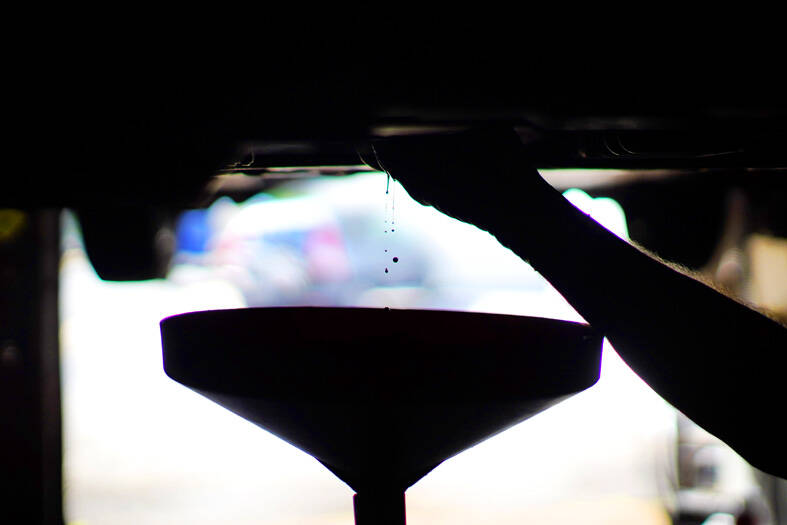Oil on Friday rallied to a three-week high and clinched a second straight weekly gain after Russia warned it might cut output by as much as 700,000 barrels per day in response to sanctions on the nation’s crude.
With trading volumes dwindling heading into the Christmas holiday, Russia’s threat outweighed the effects of a winter freeze sweeping across the US. The cold has halted one-third of refining capacity on the Texas gulf coast and as much as 350,000 barrels a day of crude output in North Dakota.
West Texas Intermediate for January delivery gained 2.67 percent to US$79.56, rising 7.09 percent from a week earlier.

Photo: AP
Brent crude for February delivery rose 3.63 percent to US$83.92, up 6.17 percent for the week.
Gasoline futures also rose to the highest in three weeks following the refinery outages, although supply is in good shape: Gulf Coast gasoline stockpiles are at a record high for this time of year, and diesel inventories are above normal as well.
Crude is still on track for a modest yearly gain after a volatile year in which Russia’s invasion of Ukraine upended oil markets. The invasion led G7 countries to imposed a US$60 per barrel price cap on Russian crude in an effort to reduce the Kremlin’s income while keeping exports on the market.

The US dollar was trading at NT$29.7 at 10am today on the Taipei Foreign Exchange, as the New Taiwan dollar gained NT$1.364 from the previous close last week. The NT dollar continued to rise today, after surging 3.07 percent on Friday. After opening at NT$30.91, the NT dollar gained more than NT$1 in just 15 minutes, briefly passing the NT$30 mark. Before the US Department of the Treasury's semi-annual currency report came out, expectations that the NT dollar would keep rising were already building. The NT dollar on Friday closed at NT$31.064, up by NT$0.953 — a 3.07 percent single-day gain. Today,

‘SHORT TERM’: The local currency would likely remain strong in the near term, driven by anticipated US trade pressure, capital inflows and expectations of a US Fed rate cut The US dollar is expected to fall below NT$30 in the near term, as traders anticipate increased pressure from Washington for Taiwan to allow the New Taiwan dollar to appreciate, Cathay United Bank (國泰世華銀行) chief economist Lin Chi-chao (林啟超) said. Following a sharp drop in the greenback against the NT dollar on Friday, Lin told the Central News Agency that the local currency is likely to remain strong in the short term, driven in part by market psychology surrounding anticipated US policy pressure. On Friday, the US dollar fell NT$0.953, or 3.07 percent, closing at NT$31.064 — its lowest level since Jan.

The New Taiwan dollar and Taiwanese stocks surged on signs that trade tensions between the world’s top two economies might start easing and as US tech earnings boosted the outlook of the nation’s semiconductor exports. The NT dollar strengthened as much as 3.8 percent versus the US dollar to 30.815, the biggest intraday gain since January 2011, closing at NT$31.064. The benchmark TAIEX jumped 2.73 percent to outperform the region’s equity gauges. Outlook for global trade improved after China said it is assessing possible trade talks with the US, providing a boost for the nation’s currency and shares. As the NT dollar

The Financial Supervisory Commission (FSC) yesterday met with some of the nation’s largest insurance companies as a skyrocketing New Taiwan dollar piles pressure on their hundreds of billions of dollars in US bond investments. The commission has asked some life insurance firms, among the biggest Asian holders of US debt, to discuss how the rapidly strengthening NT dollar has impacted their operations, people familiar with the matter said. The meeting took place as the NT dollar jumped as much as 5 percent yesterday, its biggest intraday gain in more than three decades. The local currency surged as exporters rushed to